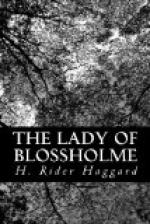Making no answer, Jeffrey slipped the bits back into the horses’ mouths and led them out. Now the full moon had appeared like a great white eye between two black banks of cloud and turned the world to silver. It was a dreary scene on which she shone; a dazzling plain of snow, broken by patches of hawthorns, and here and there by the gaunt shape of a pollard oak, since this being the outskirt of the forest, folk came hither to lop the tops of the trees for firing. A hundred and fifty yards away or so, at the crest of a slope, was a round-shaped hill, made, not by Nature, but by man. None knew what that hill might be, but tradition said that once, hundreds or thousands of years before, a big battle had been fought around it in which a king was killed, and that his victorious army had raised this mound above his bones to be a memorial for ever.
The story was indeed that, being a sea-king, they had built a boat or dragged it thither from the river shore and set him in it with all the slain for rowers; also that he might be seen at nights seated on his horse in armour, and staring about him, as when he directed the battle. At least it is true that the mount was called King’s Grave, and that people feared to pass it after sundown.
As Jeffrey Stokes was holding his master’s stirrup for him to mount, he uttered an exclamation and pointed. Following the line of his outstretched hand, in the clear moonlight Sir John saw a man, who sat, still as any statue, upon a horse on the very point of King’s Grave. He appeared to be covered with a long cloak, but above it his helmet glittered like silver. Next moment a fringe of black cloud hid the face of the moon, and when it passed away the man and horse were gone.
“What did that fellow there?” asked Sir John.
“Fellow?” answered Jeffrey in a shaken voice, “I saw none. That was the Ghost of the Grave. My grandfather met him ere he came to his end in the forest, none know how, for the wolves, of which there were plenty in his day, picked his bones clean, and so have many others for hundreds of years; always just before their doom. He is an ill fowl, that Ghost of the Grave, and those who clap eyes on him do wisely to turn their horses’ heads homewards, as I would to-night if I had my way, master.”
“What use, Jeffrey? If the sight of him means death, death will come. Moreover, I believe nothing of the tale. Your ghost was some forest reeve or herdsman.”
“A forest reeve or herdsman who wanders about in a steel helm on a fine horse in snow-time when there are no trees to cut or cattle to mind! Well, have it as you will, master; only God save me from such reeves and herdmen, for I think they hail from hell.”
“Then he was a spy watching whither we go,” answered Sir John angrily.
“If so, who sent him? The Abbot of Blossholme? In that case I would sooner meet the devil, for this means mischief. I say that we had better ride back to Shefton.”




